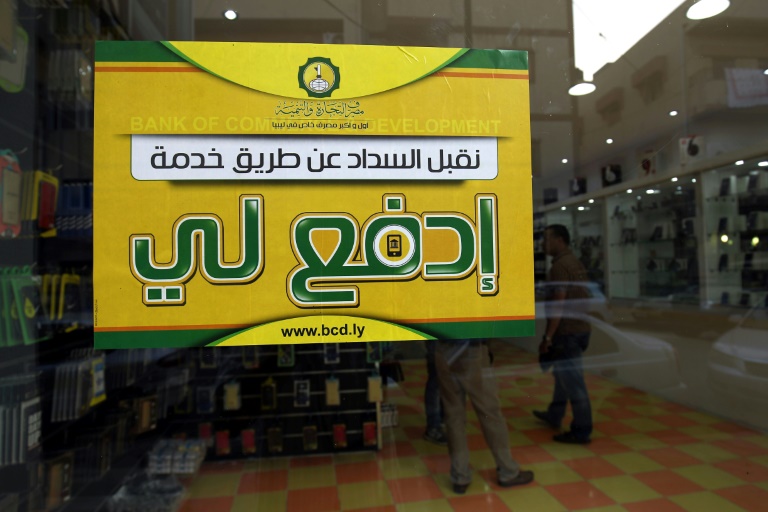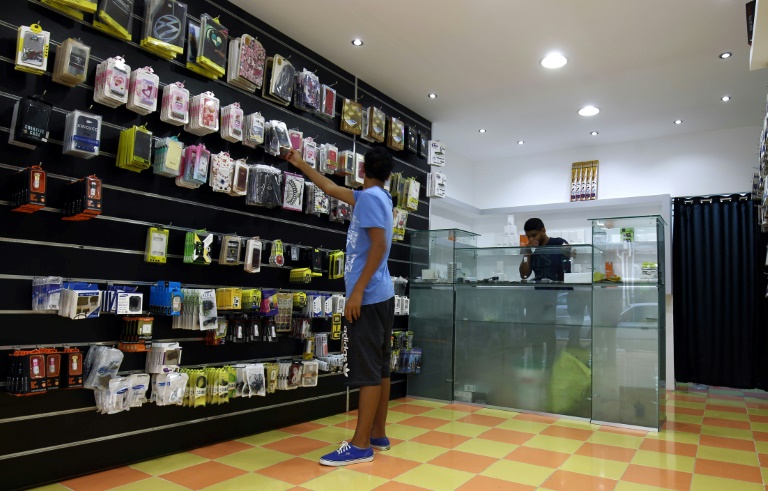When a cash crisis struck the war-torn North African country of Libya, many people were forced to queue for days to withdraw their savings.

But electronic payments systems set up to tackle the dearth of cash have struggled to gain credibility amid accusations of abuse.
Said Fayez Fadlallah, 35, uses a mobile phone app to pay for a trolley-full of groceries at a large supermarket in second city Benghazi.
“Now I don’t have to spend hours or even days queueing at the bank to withdraw cash,” he said. “They really solved a problem for us.”
Years of violence and political chaos since a 2011 NATO-backed uprising that toppled and killed longtime dictator Moamer Kadhafi have left Libya’s state institutions in crisis — including the central bank.
In 2014 it split into two, with the different branches overseen by rival governments in the west and east.
The resulting cash crisis, fuelled by spiralling inflation, caused huge queues to form at the banks and left many people unable to access their salaries.
In response, the banks have launched electronic payment systems.

A picture taken on July 24, 2017 shows a poster of the “Edfali” (Arabic for “pay me”) mobile phone app in a Benghazi shop window
In Benghazi, the Bank of Commerce & Development’s “Edfali” (Arabic for “pay me”) and Wahda Bank’s “MobiCash” allow users to buy goods, pay restaurant bills and access pharmacies and hospitals.
But not everyone is happy. At the exit of the same Benghazi supermarket, his arms full of produce, Ayman al-Obeidi, 46, said the new payment systems were not working.
“We were told… that prices would remain unchanged” compared with cash prices, he said. “But we saw a 40 percent increase on payments with Edfali.”
– Bank rush –
Many Libyans have not had free access to their bank accounts since 2014.
Braving cold in winter and blistering heat in the summer, they rushed to the banks on hearing rumours of cash deliveries and queued for hours without any guarantee they would be able to access their own money.
The crisis has destroyed public confidence in the financial sector.
“People don’t trust the banks any more,” one bank employee told AFP, speaking on condition of anonymity.
“They want to be sure they can get enough cash in case anything happens and the banks close, or if they can’t leave their houses.”
Employees of Libya’s vast public service still have their salaries paid directly into their accounts. Many have turned to electronic payment systems to access their money.
Such services allow buyers to credit the seller’s account. They then receive an SMS message confirming that the transaction has been completed.
Wahda Bank’s spokesman al-Motassem al-Fitouri said transactions via MobiCash are “very secure”.
“It is not even necessary to have a smartphone to make payments, nor does the merchant have to have a point-of-sale device,” he said.

Shopping at a store in Libya’s second city Benghazi where customers can use a mobile phone app to pay for their purchases electronically
The banks are aware that the services are open to abuse, however.
On its website, the BCD encourages customers to report price hikes on payments via “Edfali”.
And many businesses that were enthusiastic at first have since dropped the service.
Salah al-Agouri, a businessman whose clients pay him using Edfali, is critical.
“The bank did not respect its commitments,” he said.
“It assured us that we would be able to withdraw cash to the value of 25 percent of sales via this service, but that wasn’t the case.”
Support Local Journalism
Add The Citizen as a Preferred Source on Google and follow us on Google News to see more of our trusted reporting in Google News and Top Stories.






